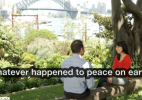“We must always see the image of God in other human beings.”
Bishop Younan of Jordan explains why Fervr readers need to pray for the church in the Middle East.
We hear about the Middle East on the news, but how much do we really know about the Christians living there? Fervr was privileged to speak with Rev. Dr. Munib Younan who is Bishop of the Evangelical Lutheran Church in Jordan and the Holy Land. Bishop Younan is passionately involved in primary and high school education to promote peace between Muslim, Jewish and Christian students.
Can you tell us a little about yourself?
I always introduce myself as an Arab Palestinian Christian, Evangelical Lutheran, but I am a refugee. We have been in the country for 2000 years—we didn’t convert from any religion. In Acts 2:11 you read that the Arabs also got the Holy Spirit and they were also preaching the gospel in the Arabic language since Pentecost. So we are the decedents of those Arabs who preached the gospel at that time. This is the reason we have been in the country for 2000 years. We have always lived with Muslims and Jews. Our numbers today are decreasing due to the difficult political situation and the lack of job opportunities. We Palestinian Christians are an integral part of our society. We don’t consider ourselves a minority—or a protected minority. We are instruments of peace, brokers of justice, defenders of human rights, initiators of dialogue.
Can you tell us about your church’s ministry in the school?
We have a very strong education ministry with 3000 children. 50% of our children are Muslims and the others are from the other Christian denominations. Our aim is to mould the Palestinian Christians, to teach them to live with the other religions—Islam, Judaism and Christianity—and to teach them non-violent education and also to dialogue and to promote the role of women.
What is the aim of your ministry?
Why do we do it? Because of our Lord and Saviour who died on the cross and gave us the message of the good news, the message of salvation. He has called us to be living witnesses in the circles in which we are living—a multicultural society with Muslims and Jews. That is our call as Arab Palestinian Christians in the country where the Lord incarnated, died and was risen.
Why is education important?
Education is the only transformative power. When you are educated to see the image of God in the one who is different—the Muslim or the Jew or the Hindu—then your faith is challenged, your humanity is challenged, and you learn to see that the Lord has given us a common humanity. And we have to work for this common humanity regardless of race, ethnicity, religion, denominational background. I think that is possible today and, in the midst of extremism and xenophobia, the role of the church in the Middle East and in the world is to be prophetic [but, to be able] to teach that we have to accept a multicultural society. We have to live with the others, to build a common future with those who are different to us.
How do you encourage your students to accept each other’s diversity?
We help the students to hear and listen to the 'other'—not only to themselves. And this is the reason why we have dialogue classes, where Muslim and Christian students [are together and can] sit, discuss, hear the other, learn about the traditions of the other, see the hopes of the other and, at the same time, respect the difference and the traditions of the other.
So the classes help Muslim children listen to Christian children and vice versa?
Yes, and in the classroom they’re friends. A Muslim can have a Christian friend and a Christian [can have a Muslim friend]. I can tell you an example with my daughter who just graduated from university—her best friends were Muslims. Friendship is not built on what religion you are, friendship is built, you see, on how human you are, on how much you accept others. And God gave us this special humanity and we must always see the image of God in other human beings.
In our country, our cultural conflicts may not be as intense as those in the Middle East, but how can we as Christians love people from different cultures?
First of all, we must have small mouths and big ears. We have to listen and not only hear. We have to listen to what message they are telling and who they are. Secondly, I must understand that my culture is not the only culture in the world, my problem is not the only problem in the world; others have other problems which can be more or less. And once I listen and accept the other as they are, it makes a difference. And thirdly, which is very important for me, [from when I was] a Christian youngster I have always pursued the love of Christ which has changed me. When I express my love of Christ to another who is different, maybe he or she will be touched.
Do you think there is the possibility for peace in the Middle East?
This is my dream and this is my vision. I still, despite all odds, think peace in the Middle East is possible. And that peace in the Middle East is [dependent] on the sharing of Jerusalem— that means it must be shared between Jews, Christians and Muslim Palestinians, with no army. Jerusalem is a Holy City for the three religions and that is very important, and [all the] nations can enjoy it. Peace in the Middle East is possible but we need politicians who are courageous to take steps.
How can Fervr readers be praying for the Middle East?
Please, we are your sisters and brothers in Christ. It is very important that you remember us every day in your prayers. I’m also asking the Lutheran Church in Australia to assign one Sunday in the year to pray for Jerusalem, for Palestinian Christians and for other Christians in the area, that they may continue to carry the message of Christ in the country. And maybe every Christmas and every Easter when you hear about the story of the birth of Jesus and the resurrection, I think that is [a good] time to remember us and encourage [others] to pray for us, that peace may come to Jerusalem.






